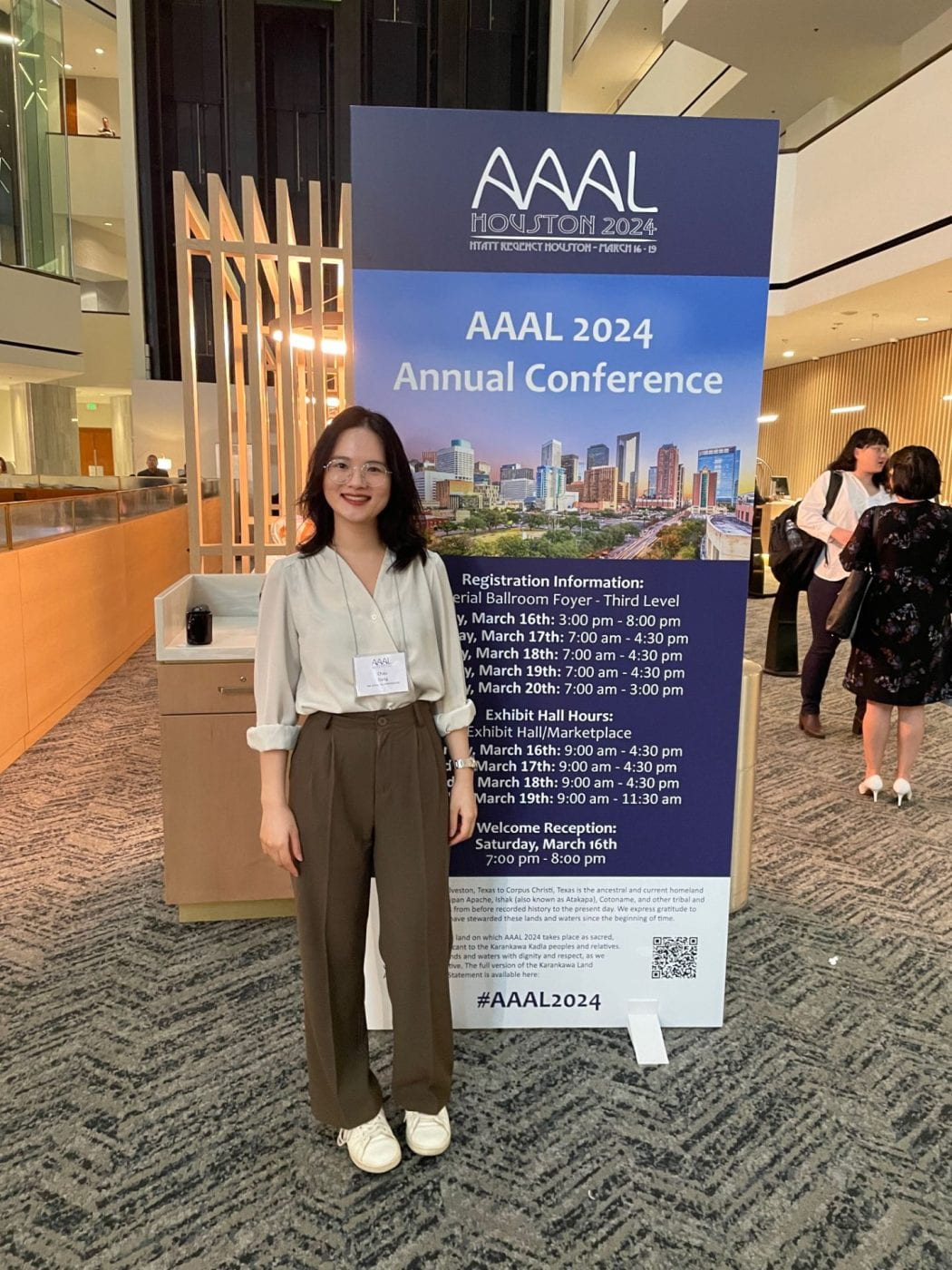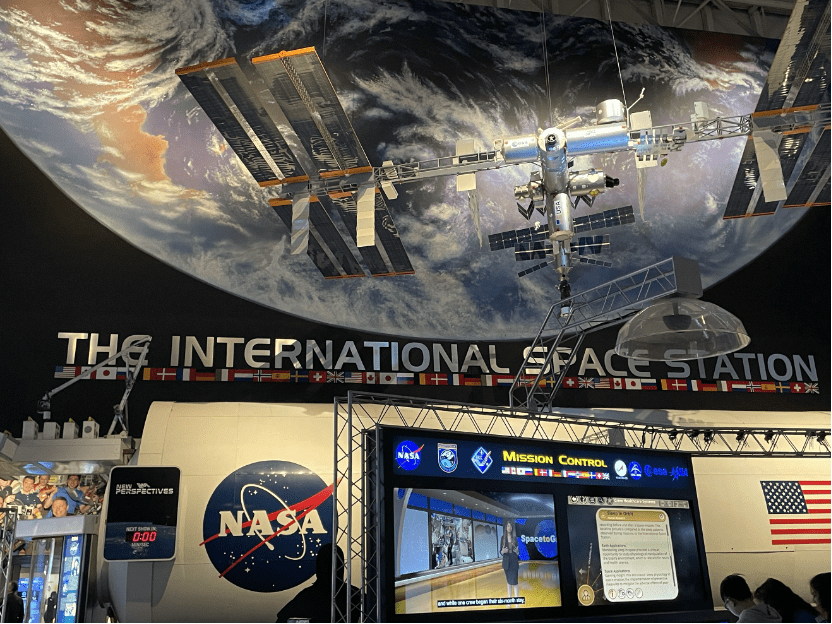
Partaking in Ongoing Academic Conversation: Dang Ngoc Chau’s Research Presentation Experience at the American Association for Applied Linguistics Conference (AAAL) 2024 in Houston
Hangyu Zhang
Chau Dang (Dang Ngoc Chau) is a third-year PhD candidate at the School of Languages and Linguistics, University of Melbourne. Last year, Chau shared some interesting points about her research project, which was enlightening. From 16th March to 19th March this year, Chau presented at the AAAL 2024 conference in Houston, United States, with the aid of the Miegunyah International Scholarship.
Hangyu interviewed Chau about her preparation for and experience during the conference.
Hi Chau! First of all, congratulations on your successful presentation at AAAL 2024! To get us started, how do you feel about this experience in general?
It was amazing! It was probably one of the best experiences I have had so far during my PhD journey because it was the first time ever that I attended a conference. In addition, as you know, AAAL is such a significant and vibrant conference, almost the biggest one in the academic field of applied linguistics. So, it was a splendid experience in which I had a chance to meet really lovely people and learn a lot.
That’s wonderful. You attended the conference as a presenter. Can you briefly introduce the topic of the project you presented at the conference?
I presented a part of my findings from my ongoing research project, entitled “Teacher Agency in Interpreting and Appropriating English Medium Instruction (EMI) Policy”. I looked at a specific case of an EMI computer science programme in Vietnam and investigated how three teachers of the programme exercised their agency from an ecological perspective. My presentation was part of a round table discussion, rather than an individual speech. A round table discussion includes three presentations and 10 minutes each, and we had half an hour after that for Q&A and to discuss our research projects. It was really informative because I had the chance to listen to and interact with other people working in similar areas. The session was quite well-attended with a lot of other researchers who provided some useful feedback and asked relevant questions as well.
It sounds like a very interactive session. So, were the attendees sophisticated and experienced researchers in this field or junior researchers like higher degree research students? How was your interaction with other academics?
Well, AAAL is a platform for everyone. Therefore, I met and spoke to other PhD candidates, some researchers who had just completed their PhD degrees, postdoctoral researchers, as well as prestigious professors working at universities worldwide. Yes, there were academics of different experience levels, which was really fantastic! At my round table, the other two presenters also worked on topics relevant to mine, including multilingual classrooms in the context of Africa and the context of Korean. In this way, we could relate a lot, discussing practices in countries where English is not the official language, and where teachers may encounter various problems. One interesting point is that, as you know, the policies in different countries are really different. Thus, the ways that teachers would interpret and appropriate the policy are divergent in different contexts as well. It is really interesting to see the way that teachers in another context, for example in Korea, would enact agency to support their students from their own will and with not much support from the macro level. So, I think it is meaningful to see relevant research in different context, which can provide a lot of useful insights for my own research.
Meanwhile, I also attended other talks and sessions and took lots of notes. They helped me look at my project from a broader perspective as well and from different angles. It was absolutely an eye-opening experience.
That’s wonderful! Was there anything that left you with a very deep impression during the couple of days at the conference?
Well, I met those whose work I had cited a lot. I think this was one of the best and most impressive parts. For example, I met Prof Nancy Hornberger, a big name in language policy research. I cited a lot of her work and read her books and then I met her in person! I was not a volunteer at the reception, but I was just talking with a new friend there. She came in and asked for the name card. We then asked what her name was, and she replied, “Nancy Hornberger”. I gave her the name card and told her that I had read her books and admired her research. She was so friendly and then we talked a bit. I was so nervous and excited, but it was just such a great experience to see those whose research had enlightened me.
Thanks for sharing that! It’s always good to meet people during the conference and talk to them in person. Before the conference, how did you prepare for that?
Sure! To prepare for the conference, there are three things I want to mention. First is looking out for conferences. Because most conferences, especially major ones where they accept quite a lot of papers, would release their “Call for Papers” announcement quite early, like six months or eight months before the actual conference date. So look out for the conferences that you want to attend, check the deadline, make sure that you prepare your proposal, and submit it by the deadline. When I was preparing for my presentation at AAAL, they required the abstract of the paper about one year before. I discussed this with my supervisors, and they gave me some very useful feedback.
Another thing is that once your proposal is accepted, it is time to look out for scholarships because, you know, travelling to conferences could be extremely expensive, especially if you go to Europe and the United States. I was fortunate enough to get the Miegunyah International Scholarship, which is quite a generous travel grant for PhD and graduate researchers. They provide an allowance of $10,000 for those who attend major conferences in the field of humanities and social science outside of Australia.
Interestingly, there were no advertisements about this scholarship via email or word of mouth. Instead, I was just scrolling through the scholarship website of the University of Melbourne, and I noticed that one matched my requirements and eligibility. Hence, I would like to mention as well that there could be some scholarship that many of us wouldn’t be aware of. Hopefully after this interview, by sharing my experience, next year, more students from our school will get that scholarship. Certainly, there are other grants from the university for graduate researchers as well so look out for them!
My final point is about preparing for the visa. As a Vietnamese citizen, I need a visa to visit most countries, including the United States. From my experience, I could not book an interview for a visa application in Melbourne, and I had to fly to Perth. They only asked me one question, but then I still had to be there in person for the collection of fingerprints as well. I flew to Perth and back, which was a bit time-consuming. I will definitely prepare for my visa earlier next time.
Those are very useful suggestions, particularly the tips and information about scholarships. So, the conference was in Houston, did you go sightseeing or explore the city after the conference?
Yes, but I didn’t have much chance for that due to the really packed schedule. But on the last day, I had a chance to visit NASA (Johnson Space Center). Houston is famous for that. I spent a whole day there, and it was amazing. As for the city, it is quite different from Melbourne. For example, Melbourne CBD is often busy and bustling, but in Houston, the centre is just full of big buildings for offices. It was relatively quiet because the residential areas including restaurants and grocery stores would be far out from the city centre.

It’s your third year now and you’ve already made some accomplishments. Could you share a bit about your plan for the next couple of years?
Yes, similar to any other PhD candidates, at this point, I would prioritise my PhD research and to complete it within the next year. I am going to write up my results and next year, if possible, I would like to attend AAAL 2025 in Denver again. I plan to attend another conference to present a different part of my PhD research. I am preparing for that!
Thank you so much for sharing this experience with us today, Chau!
My pleasure! Thank you, Hangyu!